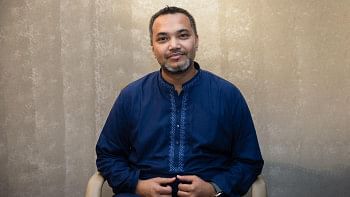Nizami turned Chhatra Sangha into Al-Badr
Jamaat-e-Islami chief Motiur Rahman Nizami was the one who decided to turn the party's then student wing Islami Chhatra Sangha into the Pakistan army's death squad Al-Badr in 1971, the prosecution told a war crimes tribunal during the closing arguments of his case.
Prosecutor Mohammad Ali, during the first day of the second closing argument in the case yesterday, said Nizami had control over the Al-Badr and incited its members to commit crimes and directed them to kill intellectuals.
Ali said there were many intellectuals who had supported a united Pakistan during the Liberation War but the Al-Badr members did not kill them. Rather, they killed those who worked for the independence of Bangladesh.
“The list [hit list of intellectuals] was prepared after discussion with the Pakistani army,” the prosecutor said.
Pointing to the books and documents exhibited at the tribunal, he said on the basis of the documents, he was able to prove beyond any shadow of doubt that Nizami was the chief of Al-Badr.
Published in 1998, the book “Sunset at Midday” reads, “The workers belonging purely to Islami Chhatra Sangha were called Al-Badr, the general patriotic public belonging to Jamaat-e-Islami, Muslim League, Nizam-e-Islami, etc, were called Al-Shams and the Urdu-speaking generally known as Bihari were called al-Mujahid.”
Quoting a prosecution document, “Ekatturer Ghatok o Dalalra Ke Kothay”, Ali said, “On August 2, 1971, at a rally at Muslim Institute in Chittagong Nizami had said, 'If the patriotic people would come forward to resist miscreants on March 1 [of 1971], such a situation might not have happened …. But when the Muslims failed, Allah saved the country through the army.'”
To mark the independence day of Pakistan on August 14, Nizami had led a procession of Islami Chhatra Sangha at Dhaka University. Participants of the procession chanted the slogan, “With our blood Pakistan will survive, kill India's agents”, Ali said.
The book reads: “On September 23 at a tea party organised by Islami Chhatra Sangha at Dhaka's Alia Madrasa, Nizami said that only the patriotic youths of East Pakistan are able to counter the terrorist activities by armed Indian infiltrators and their local agents effectively.”
Ali said the Al-Badr members turned into ferocious militiamen who worked for the Pakistani occupation force and killed several hundred intellectuals towards the end of the Liberation War.
Ali placed arguments for more than two hours and the proceedings of the case were adjourned until today when the prosecution is expected to resume its arguments.
Nizami, facing 16 crimes against humanity and genocide charges, was brought to the tribunal yesterday.
Three days after its reconstitution on February 23, International Crimes Tribunal-1 decided to hear again the closing arguments of Nizami's case.
In November last year, the tribunal kept the case waiting for a verdict after completing the hearing of closing arguments from both sides.
The tribunal was reconstituted as a result of the former chairman of the tribunal going into retirement.

 For all latest news, follow The Daily Star's Google News channel.
For all latest news, follow The Daily Star's Google News channel. 



Comments